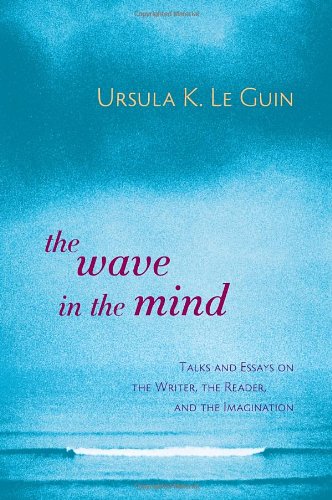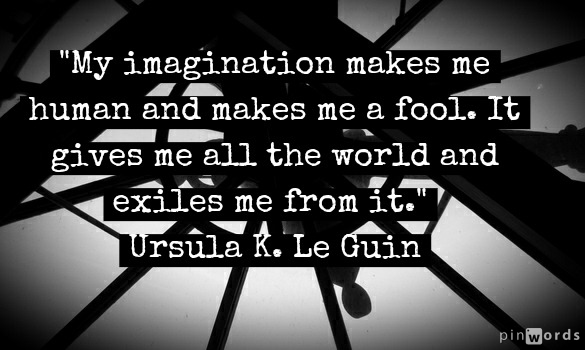Imagination is a powerful force for progress. So why has it been sidelined in the one place it should be most welcome – literature.
In his now famous quote, Albert Einstein claimed that imagination was more important than knowledge. When Einstein wrote those words in 1929, those who knew about such things might have said putting a man on the moon was impossible. But those who imagined more, including writers of science fiction, knew better. We know that imagination is a powerful force for progress in our lives and in society. And yet it seems that in the place imagination should be most celebrated – in stories, fiction and literature – it has long been sidelined.

Ursula K Le Guin, arguably the greatest living writer of imaginative literature, made a powerful defence of imagination in her speech to the National Book Awards on Thursday, at which she was presented a lifetime achievement award. Le Guin dedicated her win to the “the realists of a larger reality” who for 50 years had been excluded from literature’s awards, her “fellow authors of fantasy and science fiction – writers of the imagination.”
It’s hard to dispute the exclusion of writers of imagination from mainstream literature, not simply from its prizes but from every part of literary culture. But why has this happened? The standard explanation draws on one part quality – genres like science fiction simply aren’t “well written” enough – and two parts the idea that imagination is in some way childish. Writers of imagination are fine when they address children and adolescents, but adults are meant to get their head out of the clouds and keep their feet firmly planted in reality.
This idea reaches further than literature of course. Over the same five decade period Le Guin references, our education system has systematically sidelined the imaginative disciplines of the arts and humanities, until we find ourselves at the position today where any non STEM subject has seen a de facto obliteration of its status and funding. That’s not a criticism of STEM subjects or their creative potential, but as Einstein was trying to tell us, those subjects are at their strongest when honed by a powerful imagination.
Such an imagination can look at our world today and see the vast potential for it’s future, and the terrible risks that threaten progress. It’s no coincidence that the imaginative literature of science fiction has made utopia – the discussion of how to make a better world (a discussion Le Guin has played no small part in) – one of its core themes. It seems more than credible that the forces that might lead us to a dystopian future might tend to surpress those powerful imaginations that can envision their defeat.
Imaginative literature itself has been in a virtual civil war in recent years. When fantasy novelist N K Jemisin called for a global literature of imagination, in a speech that echoes Le Guin’s both in its meaning and its passionate intensity, it was a recognition that imagination can not be limited by gender or race. But the venomous, racist attacks made on Jemisin in response suggest that some, a small but bitter minority, do not agree. When that same, bitter minority were involved with block voting at this years Hugo awards, they were sent packing by award voters outraged at an attempt to limit and politicise imaginative fiction.
Anne Leckie’s clean sweep of this years major awards for science fiction, and Sofia Samatar’s victory at the World Fantasy Award, suggest imaginative literature is indeed becoming global and starting to overcome boundaries that had held it back. Despite, or perhaps because, of the barriers placed in its path, imaginative literature arrives in 2014 far stronger than it has been for decades. Ursula Le Guin’s honouring at the National Book Awards is one of many indications that, far from being excluded any more, imaginative literature is now at the very heart of literary life.
But if anyone is responsible for that change it is not publishers, or even writers, but readers. The internet and it’s massive disruption of the traditional publishing industry has allowed readers not just to vote with their wallets, but to evangelise for imaginative literature across thousands of blogs and fan forums, to support diverse new writing through crowdfunding and other platforms, and to become the new writers, editors and independent publishers of imaginative literature. There’s a grass routes revolution in publishing, and the power of imagination is at its heart.

This reminds me a bit of the whole Pre-Joycean Fellowship idea that Brust and his friends came up with. “Serious literature”, in and post Joyce, pulled away from popular literature, accentuating and defining a dividing line between genre fiction and literary fiction
LikeLike
I’m forever divided on the issue. I was an SF fan first, but now I find great value in Joyce as well. It’s not the writers creating the problem n my view, but the industry and frameworks around them.
>
LikeLike
Great article, as usual, Damien. I was going to chime in at the end with something pithy, but you seem to have covered all the bases.
LikeLike
Great article. I think you nailed it when linked the crescent respect for imaginative literature and the disruption of traditional publishing.
LikeLike
Thanks Alex. I think I’ll expand on that point in a future post.
>
LikeLike
‘The imagination is not a state: it is the human existence itself.’ What I want to see now is imagination unleashed into the realm of NON-fiction, arguments for the impossible…
LikeLike
What “arguments(s) for the possible” would you put forward Jasun?
>
LikeLike
possible or impossible?
LikeLike
Impossible!
>
LikeLike
this realm can’t be entered into lightly; for starters the idea that it IS possible to argue the impossible is impossible, right? To argue for the impossible means that you have to believe it. Is it possible to make a case for the impossible so strong that the writer ends up believing it? (PK Dick would be a perfect case study in this phenomena)
Gotta go now, I have another assignment! ;)
LikeLike
I love this post, especially the last paragraph.
LikeLike
Thanks Ryan. I might expand on some of those ideas in future.
>
LikeLike